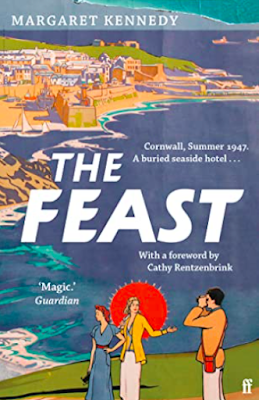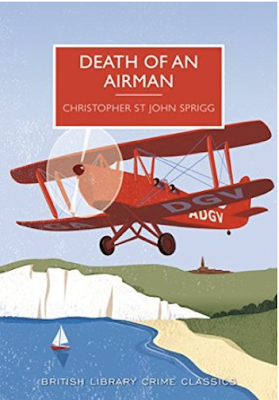“You can never get a cup of tea large enough or a book long enough to suit me.” ― C.S. Lewis
Owned and Unread Project
Monday, January 23, 2023
Back To the Classics Challenge 2022: The Winner!
Sunday, September 4, 2022
Mr. Skeffington by Elizabeth von Arnim
 |
| Lots of Italian reprints of von Arnim's novels. Nice cover but it really doesn't reflect the mood of the book. |
 |
| Nice cover on this French edition |
So, not among my favorites of her novels, but I still have three left on the shelves unread -- The Caravaners, Vera, and The Jasmine Farm. I'm really hoping I like those better.
I'm counting this as my Classic by a Woman Author for the Back to the Classics Challenge.
Tuesday, June 28, 2022
The Feast by Margaret Kennedy
 |
| Cover of a 1969 reprint. This one is pretty much perfect. |
 |
| The copy of my edition. Nice, but I don't think it really reflects the setting of the book. |
The book then jumps back seven days and describes the final week of the resort and its inhabitants. Set in 1947, the Siddal family are struggling to make ends meet in their ancestral home on the Cornish coast and have converted it to a boarding house, not so much a hotel. Mrs. Siddal is trying to make a go of it but her husband has mentally checked out and doesn't lift a finger, hiding in a room under the stairs. Her three grown sons help but are ready to leave the nest. There are also some servants including Miss Ellis, a snobbish, gossipy housekeeper and Nancibel, the loyal housemaid. Then there are the guests, including two families, the wealthy Gifford family with four children; the Coves, with three; an unhappy couple, the Paleys, who are grieving for their dead daughter; plus an obnoxious clergyman, his put-upon daughter Evangeline; and a late arrival, a bestselling author and her chauffeur. It's almost like an Agatha Christie novel, but instead of a murder, it's a natural disaster, and the reader has to work out who will live and who will die.
 |
| The original 1949 cover. Good, but I like the 1969 cover better. |
 |
| A French edition from 1956 |
 |
| A new French reprint. Good, but a little too cheerful for what's inside the book. |
This is an absolutely brilliant book and I know it will be one of my top reads of the summer, if not the entire year. I've only read one other book by Margaret Kennedy, Troy Chimneys, which is also good but very different from this one. Several of her other books are still in print including her other most famous book, The Constant Nymph, which I also own and will definitely move up on the to-read pile.
I'm counting this as my Classic Set In A Place You'd Like To Visit for the Back to the Classics Challenge. It's also the first read for my Big Book Summer Reading Challenge.
Sunday, May 1, 2022
Zoladdiction 2022: His Excellency Eugene Rougon
Sunday, March 13, 2022
Castle Richmond by Anthony Trollope
It is impossible that these volumes should be graced by any hero, for the story does not admit of one. But if there were to be a hero, Herbert Fitzgerald would be the man.
A Victorian novel by Anthony Trollope, set in Ireland? This book could not be any more in my wheelhouse. For the Back to the Classics Challenge I needed a book from the 19th Century and I still had five unread Trollopes on my TBR shelve. Two of them were set in Ireland so that seemed like an obvious choice for March.
Trollope spent nearly twenty years in Ireland working for the post office, and began his writing career there. His first two novels are set in Ireland, and were written during the Great Famine. Castle Richmond, his third novel set in Ireland, was published in 1860, but is set several years earlier. It does use the Great Famine as a plot point, but much less so than I was expecting.
Basically, it's the story of a love triangle between two cousins of the landed gentry, Owen and Herbert Fitzgerald, and the girl they both love, Clara Desmond, the beautiful but poor daughter of Countess Desmond, a young widow whose marriage was less than happy. There's also a complicated plot about the inheritance of Castle Richmond, the seat of the wealthy Fitzgerald family. But I'm getting ahead of myself.
Owen Fitzgerald is the young squire of Hap House in County Cork -- technically gentry, but the poorer branch of the Fitzgerald family, and untitled. He is handsome and dashing, and befriends the young Earl of Desmond, acting as a sort of older brother. They go hunting and fishing and whatnot, and Owen also notices the young Earl's older sister, Clara, who is about sixteen. Eventually he declares his love for her, and she returns his feelings. However, her young widowed mother, who is not yet forty, quashes all her hopes -- Owen is too poor and lacks a title, so she refuses to acknowledge any engagement and forbids Clara to see or write to Owen. (The reader is also aware that the young Countess is also crushing on Owen and secretly wanted him for herself).
About a year Clara is befriended by two of Owen's distant cousins, Mary and Emmeline Fitzgerald, from the wealthier portion of the Fitzgeralds -- the family living at Castle Richmond. She spends time with them and is much thrown together with their brother Herbert, the heir and future Baronet. He's younger and more bookish than his dashing cousin Owen, who considers him a prig. It would seem that Clara and Herbert would be a perfect match -- she's beautiful and he's rich, and they're both gentry. But that would make for a very short novel, so there must be complications -- which arrive with some nasty characters from London, Mr. Matthew Mollett and his son Abraham, who have come to County Cork to stir up trouble for the wealthy Fitzgeralds.
Before marrying Lord Fitzgerald of Castle Richmond, his beautiful wife Lady Fitzgerald had made an unfortunate marriage with a ne'er-do-well named Talbot who deserted her and her child and ran off to Paris, where he was supposedly killed in a fight over a gambling debt. Eventually, she met and married Lord Fitzgerald. Now the Molletts have arrived with the intent of blackmailing the Fitzgeralds, claiming that Lady Fitzgerald's husband is still alive and that her children are illegitimate. . . making Owen Fitzgerald the rightful heir of Castle Richmond and the title.
I liked this novel, though the love triangle and the blackmail plot lines are the strongest. But these characters are basically wealthy Protestant landowners. There's actually not that much in the story about Ireland and the famine -- that's mostly a peripheral plot point only in how it affects the main characters. As landlords, the Fitzgeralds are trying to help the starving population, and there's some infighting between the Catholic and Protestant clergy about how to best help everyone which is pretty infuriating, but that's not a large part of the story.
I also found Clara to be a very undeveloped character -- both of these men are in love with her, but she's mostly a flat character, just very pretty and sweet. She gets a little character development writing letters to both of the men in love with her, but not much. She's not as annoying as some of Dickens' ingenues, but not nearly as interesting as some of the women in Trollope's later novels.
Overall I did enjoy the novel and sped through the 500 pages in just about a week. I'm getting down to the last few unread books by Anthony Trollope. I can proudly say that I've now finished 38 (!) of his 47 novels. When I've finished them all I'm sure I'll be sad but I guess I'll just have to start reading them all over again!
This is my 19th Century Classic for the Back to the Classics Challenge, and my Irish read for the European Reading Challenge.
Tuesday, March 1, 2022
The Comedy of Errors by William Shakespeare
 |
| The Blackfriars Playhouse at the American Shakespeare Center in Staunton, VA |
Monday, February 21, 2022
The Matador of the Five Towns by Arnold Bennett
Years ago while living in Texas I was at the Half-Price Books in San Antonio whereupon I found this bought this adorably wee little volume of short stories (6.5 x 5 inches/17 x 12.5 cm) by Arnold Bennett. I had just completed and loved his novel The Old Wives Tale so why not? Well, at least ten years and three moves later I finally gotten around to finishing it. One would think that a small volume of 22 short stories shouldn't take that long, but you know how it is.
If you haven't read Arnold Bennett, he seems to me a sort of transitional writer between the 19th and 20th centuries. This volume is copyrighted 1912, but many of the stories had a more Victorian feeling. Most of his stories are about working-class and middle-class people, just slices of life set in his fictional Five Towns which are modeled on the six Pottery towns in the Staffordshire area of Northern England.
Once started, it still took me awhile to get into this book -- it's divided up between "Tragic" and "Frolic" with the majority in the latter category. The first stories is the eponymous "Matador of the Five Towns" and it's also the longest, which is probably why it seemed to take forever to get into. But once I started I found that I really enjoyed them, mostly the lighter comic "Frolic" stories. I won't go into each story into detail but just a few highlights:
"Catching the Train" -- a man and his brother are repeatedly thwarted on a train journey to a Very Important Destination which isn't revealed until the end. It's one of those trips where anything that can possibly go wrong, does so in the worst possible way.
"The Blue Suit" -- a woman slyly manipulates her nephew's wardrobe choices while on a seaside holiday in Wales, with unexpected results.
"Hot Potatoes" -- the mother of a violin prodigy desperately tries to keep her son's hands warm for a concert on a cold day.
"The Long-Lost Uncle" -- a young man has an opportunity for romance after the sudden departure of his miserly uncle.
"Why the Clock Stopped" -- a pair of aging siblings have secrets from one another.
I definitely preferred the lighter comic stories to the tragic (though they weren't so terribly tragic) and I found that many of them had delightful twist endings. They reminded me a bit of the short stories of Edith Wharton, a bit like O. Henry, and even a little like Trollope, so if you like any of these authors, you might enjoy exploring Arnold Bennett. This volume is also available on iBooks and on Project Gutenberg, as are most of Bennett's early works. To be honest, I actually ended up reading most of it on Gutenberg via my laptop because as cute as this volume was, the print was really tiny! (Plus I have become used to reading while I eat my lunch and it's so much easier while reading on a screen).
Overally I did enjoy this book and will definitely read more Arnold Bennett, I have a vintage copies of both Hilda Lessways and Buried Alive and would love to read both or either of them this year.
This is my second book for the Back to the Classics Challenge, also counting this as my UK read for the European Reading Challenge.
Sunday, January 16, 2022
Death of an Airman by Christopher St. John Sprigg
Friday, January 14, 2022
Challenge Link-Up Post: Wild Card Classic
Please link your reviews for the Wild Card Classic here. This is only for the Wild Card category. This book is your free choice -- any classic, any genre, any length, as long as it's at least 50 years old! If you do not have a blog, or somewhere public on the internet where you post book reviews, please write your mini-review/thoughts in the comments section. If you like, you can include the name of your blog and or/the title of the book in your link, like this: "Karen K. @ Books and Chocolate (Portrait of a Lady)."
Challenge Link-Up: Classic Set in a Place You'd Like to Visit
Please link your reviews for your Classic Set in a Place You'd Like to Visit here. This is only for the Classic Set in a Place You'd Like to Visit category. It can be real or fictional, and it can be a place you've been before and would like to revisit. If you like, include the place (if it isn't obvious) and why you'd like to visit in your review -- I'm sure readers would like to know!
If you do not have a blog, or somewhere public on the internet where you post book reviews, please write your mini-review/thoughts in the comments section. If you like, you can include the name of your blog and/or the title of the book in your link, like this: "Karen K. @ Books and Chocolate (Jane Eyre - Yorkshire). "
Challenge Link-Up Post: Classic That's Been on Your TBR List the Longest
Please link your reviews for your Classic That's Been On Your TBR List the Longest here. This is only for the Classic That's Been On Your TBR List category. It can be from the list of your own TBR shelves, or from any other list or pile of classics you want to read. And like all the books in this challenge, if you hate it, don't feel compelled to finish it -- cross it off your list and pick the next one!
If you do not have a blog, or somewhere public on the internet where you post book reviews, please write your mini-review/thoughts in the comments section. If you like, you can include the name of your blog and/or the title of the book in your link, like this: "Karen K. @ Books and Chocolate (Crime and Punishment). "
Challenge Link-Up Post: Nonfiction Classic
Please link your reviews for your Nonfiction Classic here. This is only for the Nonfiction Classic category. A memoir, biography, essays, travel, this can be any nonfiction work that's considered a classic, or a nonfiction work by a classic author.
Challenge Link-Up Post: Pre-1800 Classic
Challenge Link-Up Post: Classic Short Stories
If you do not have a blog, or somewhere public on the internet where you post book reviews, please write your mini-review/thoughts in the comments section. If you like, you can include the name of your blog and/or the title of the book in your link, like this: "Karen K. @ Books and Chocolate (The Canterbury Tales). "
Challenge Link-Up Post: Mystery/Detective/Crime Classic
If you do not have a blog, or somewhere public on the internet where you post book reviews, please write your mini-review/thoughts in the comments section. If you like, you can include the name of your blog and/or the title of the book in your link, like this: "Karen K. @ Books and Chocolate (The Moonstone)."
Challenge Link-Up Post: Classic by a BIPOC Author
Please link your reviews for your Classic By a BIPOC (Black, Indigenous, and Person of Color) Author here. This is only for the Classic By a BIPOC Author category. These should all be classic books that were written by an author who is not white; i.e., Black, Native American, Asian, Latin American, etc. The classic can be written in your native language or in translation. If you do not have a blog, or somewhere public on the internet where you post book reviews, please write your mini-review/thoughts in the comments section. If you like, you can include the name of your blog and/or the title of the book in your link, like this: "Karen K. @ Books and Chocolate (Their Eyes Were Watching God)."
Challenge Link-Up Post: Classic in Translation
Please link your reviews for your Classic in Translation here. This is only for the Classic in Translation category. These should all be classics that were originally written in a language other than your primary language; that is, if you are a native English speaker, it should be a classic written in another language other than English. If you are not a native English speaker, it could be in English (or any other language, other than your primary language). If you want to read the book in its original language, that's fine too!
If you do not have a blog, or somewhere public on the internet where you post book reviews, please write your mini-review/thoughts in the comments section. If you like, you can include the name of your blog and/or the title of the book in your link, like this: "Karen K. @ Books and Chocolate (Les Miserables)."
Challenge Link-Up Post: Classic by a Woman Author
Please link your reviews for your Classic by a Woman Author here. This is only for the Classic by a Woman Author category. If you do not have a blog, or somewhere public on the internet where you post book reviews, please write your mini-review/thoughts in the comments section. If you like, you can include the name of your blog and/or the title of the book in your link, like this: "Karen K. @ Books and Chocolate (Pride and Prejudice)."













